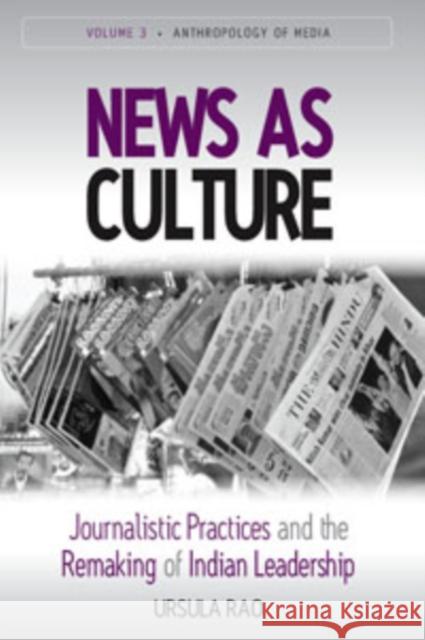News as Culture: Journalistic Practices and the Remaking of Indian Leadership Traditions » książka
News as Culture: Journalistic Practices and the Remaking of Indian Leadership Traditions
ISBN-13: 9781845456696 / Angielski / Twarda / 2010 / 228 str.
News as Culture: Journalistic Practices and the Remaking of Indian Leadership Traditions
ISBN-13: 9781845456696 / Angielski / Twarda / 2010 / 228 str.
(netto: 479,18 VAT: 5%)
Najniższa cena z 30 dni: 498,70
ok. 30 dni roboczych
Bez gwarancji dostawy przed świętami
Darmowa dostawa!
"More than just a fascinating description of newsmaking and practice in an Indian city, this book has implications for theories of news and communication that make it a timely and significant contribution to the literature on journalism and newsmaking in the changing global environment." - Mark Allen Peterson, Miami University At the turn of the millennium, Indian journalism has undergone significant changes. The rapid commercialization of the press, together with an increase in literacy and political consciousness, has led to swift growth in the newspaper market but also changed the way news makers mediate politics. Positioned at a historical junction where India is clearly feeling the effects of market liberalization, this study demonstrates how journalists and informants interactively create new forms of political action and consciousness. The book explores English and Hindi newsmaking and investigates the creation of news relations during the production process and how they affect political images and leadership traditions. It moves beyond the news-room to outline the role of journalists in urban society, the social lives of news texts and the way citizens bring their ideas and desires to bear on the news discourse. This important volume contributes to an emerging debate about the impact of the media on Indian society. Furthermore, it convincingly demonstrates the inseparable link between media related practices and dynamic cultural repertoires. Ursula Rao is Senior Lecturer of Anthropology and Sociology at the University of New South Wales in Sydney, Australia. She has worked in the fields of Media Anthropology, Religious Anthropology and Ritual Studies. Her regional specialization is India. Two recent publications are Negotiating the Divine. Temple Religion and Temple Politics in Contemporary Urban India (Manohar, 2003), and Celebrating Transgression. Method and Politics in the Anthropological Study of Cultures (Berghahn, 2006).
"More than just a fascinating description of newsmaking and practice in an Indian city, this book has implications for theories of news and communication that make it a timely and significant contribution to the literature on journalism and newsmaking in the changing global environment." · Mark Allen Peterson, Miami UniversityAt the turn of the millennium, Indian journalism has undergone significant changes. The rapid commercialization of the press, together with an increase in literacy and political consciousness, has led to swift growth in the newspaper market but also changed the way news makers mediate politics. Positioned at a historical junction where India is clearly feeling the effects of market liberalization, this study demonstrates how journalists and informants interactively create new forms of political action and consciousness. The book explores English and Hindi newsmaking and investigates the creation of news relations during the production process and how they affect political images and leadership traditions. It moves beyond the news-room to outline the role of journalists in urban society, the social lives of news texts and the way citizens bring their ideas and desires to bear on the news discourse.This important volume contributes to an emerging debate about the impact of the media on Indian society. Furthermore, it convincingly demonstrates the inseparable link between media related practices and dynamic cultural repertoires.Ursula Rao is Senior Lecturer of Anthropology and Sociology at the University of New South Wales in Sydney, Australia. She has worked in the fields of Media Anthropology, Religious Anthropology and Ritual Studies. Her regional specialization is India. Two recent publications are Negotiating the Divine. Temple Religion and Temple Politics in Contemporary Urban India (Manohar, 2003), and Celebrating Transgression. Method and Politics in the Anthropological Study of Cultures (Berghahn, 2006).











